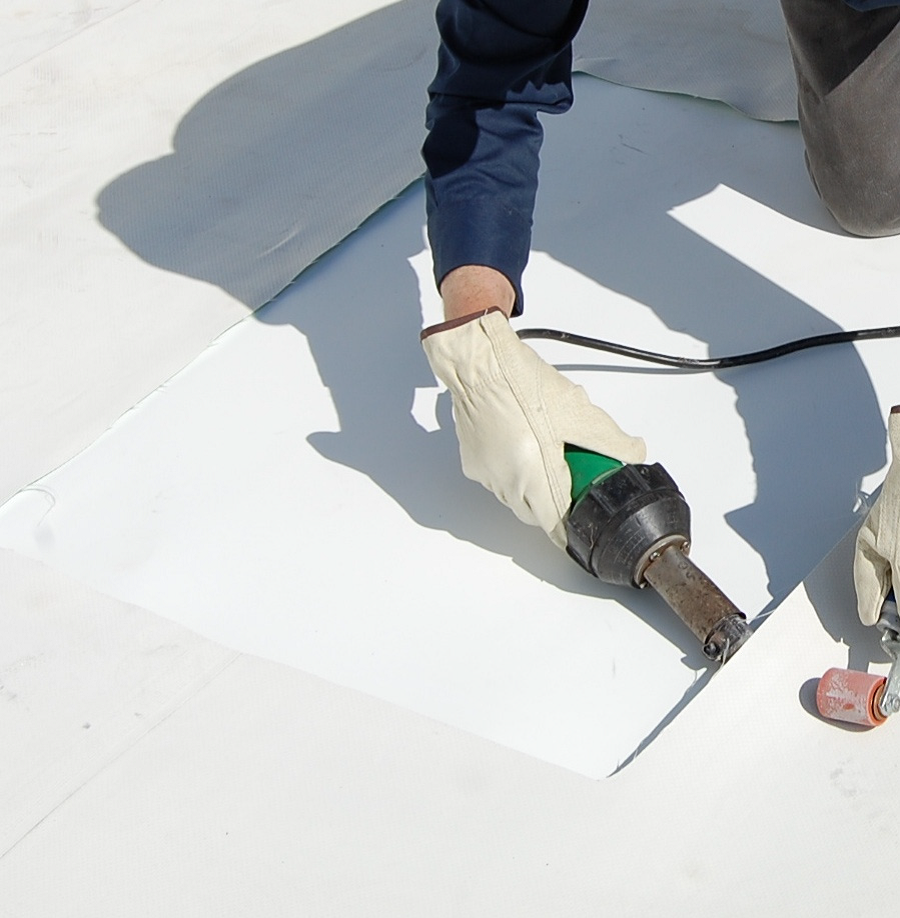
Head to Head: TPO vs. PVC Roofing Systems
Head to Head: TPO vs. PVC Roofing Systems https://pbroofingco.com/wp-content/uploads/2023/11/figure6-2.png 900 918 PB Roofing https://secure.gravatar.com/avatar/ee28a6949ea6af745b0ddec55b8b9ce1?s=96&d=mm&r=gThe Basics
TPO and PVC are both single-ply roofing membranes that offer distinct advantages. TPO is highly resilient against weather and has exceptional strength, while PVC also boasts exceptional weather durability with added UV resistance and flame-retardant properties. TPO and PVC can be mechanically fastened or fully adhered, depending on the building structure and client preference.
What’s the Difference?
For over 60 years, PVC roofing membranes have been utilized, with TPO roofs being introduced about 30 years ago. PVC roofs offer exceptional chemical resistance due to their non-reactivity to most chemicals, while TPO membranes may react to oil or exhaust from grease traps. Both PVC and TPO roofing systems meet the fire resistance standards set by FM Approvals and UL Listings. When installed and maintained, both roofing types can last well beyond the average lifespan of 20 years for commercial roofs. While price should not be the sole determining factor when selecting a commercial roofing system, it’s worth noting that TPO roofing systems are generally lower in cost than PVC roof membranes. Other factors such as usage and regional climate should also be considered.
How do they Stack Up?
TPO Benefits: The flexibility of TPO roof sheets in colder temperatures (Freeze-Thaw Cycles) and high resistance to Ultraviolet Exposure are the primary advantages offered by a TPO system. The reduced heat absorption during hot summer months may result in lower energy usage and contribute toward LEED credit qualifications. TPO membranes are Energy-Star rated and approved by the Cool Roof Rating Council, highlighting their environmental friendliness.
Not only are TPO roofing systems highly durable against chemicals, mold growth, and physical damage, but they also come with warranties of up to 30 years, emphasizing the strength and longevity of this material.
PVC Benefits: PVC roofing systems come with warranties that range from 10 to 30 years, making them a durable and reliable option for various establishments. Their excellent resistance to chemicals and fire makes them a practical choice for restaurants, airports, and commercial buildings that may deal with grease, oil, and other chemical-related issues. Additionally, PVC membranes are eco-friendly and recyclable, providing an environmentally conscious option for roofing needs.
What’s Right for Me?
Here are a few things to consider before your next roofing project:
Your Current System: By applying certain roofing systems directly onto an existing roof, the process of reroofing becomes a time and cost-effective option. The added benefit is that the older roof system does not have to be removed before the new system can be installed.
Your Commercial Roof’s Condition: Depending on the condition of your current commercial roof, you may not have the luxury of re-roofing. Although opting for a tear-off will require additional expenses, it will allow you the opportunity to choose the most suitable roofing system for your needs.
Roof-Mounted Utilities & Rooftop Penetrations: When deciding on a roof system, it is important to weigh various factors. For instance, it is crucial to determine if the roof will accommodate HVAC or fire mitigation systems. Additionally, the types and quantity of vents protruding from the structure must be considered. Also, the anticipated amount of foot traffic on the roof is also a significant concern.
Your Property’s Location: The proper choice of roofing system depends heavily on the building’s location. To make an informed decision, a reputable commercial roofing company takes into consideration various factors such as the surrounding climate, potential hazards, and local building codes.
Your Property’s Internal Requirements: Understanding the roofing system requirements for a property with temperature-sensitive inventory or those that need ventilation and exhaust systems is essential. Additionally, buildings that require a comfortable temperature for their tenants require a roofing system that enhances energy efficiency
The Bottom Line
Labor and materials are the key cost components for a flat roof or low-slope roofing system. It is up to you as a property manager or owner to choose what part of the roofing process to invest in. Labor is complete when the job is done, but the material remains to protect your property, equipment, inventory, and tenants within.
Supplemental costs to consider are maintenance and service life. The least expensive roof to own is the one with the lowest annual ownership cost (cost of the project plus annual maintenance, divided by expected service life = cost per year). Also, don’t forget that regular maintenance is required throughout the roof’s life.
A Quick Warranty Refresher
For the purchase of a PVC or TPO roofing system installation, there will be two warranties to take into consideration. First is the manufacturer’s warranty. This warranty will typically cover any defects in the manufacturing of the roofing membrane.
The second warranty is provided by the roofing contractor to cover his workmanship. This warranty should include what items are covered and what actions will void the warranty.
Click here to learn more about making the most of your commercial roof warranty from our PB Roofing Blog Back Issues or download our E-book.
PB Roofing’s Project Team
At PB Roofing, our team of experts is committed to providing you with concierge roofing services. Whether you need a new roofing system for your new construction site or a replacement for your existing one, we’ve got you covered. We understand that a sound roofing system is vital to the success of your business, which is why we ensure that our installation process is conducted with the utmost professionalism and care.
Investing in a new roof is an investment in the future of your property. Our team will conduct a thorough inspection of your roof and the underlying structure to determine whether a re-roof or tear-off replacement method is required. We will then recommend a customized solution that is specifically tailored to meet your needs.
Click here to visit our Projects Portfolio.
